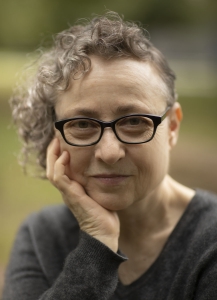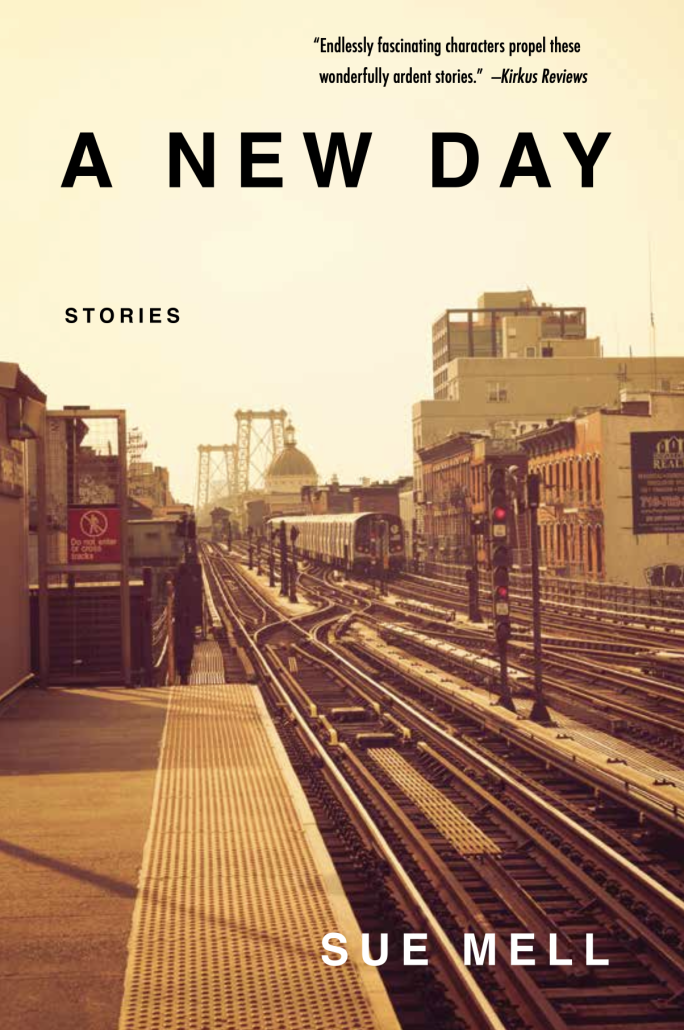A New Day by Sue Mell (fiction ’16)
Fiction alumn Sue Mell’s collection of stories, A New Day, was published on September 3rd by She Writes Press. Read an excerpt from “Photo Finish | 1999” below:
Excerpt from “Photo Finish | 1999”
1. Mick
After the divorce and two rounds of rehab, he didn’t see his daughter often. Miraculously, Stacey hadn’t poisoned her against him, but he maintained a distance that would keep Jesse’s expectations low. Mick’s sobriety remained a tentative thing, so he steered away from birthdays and holidays, with a vaguely seasonal regularity in mind. It had taken him a long time to pick up a camera again, to quiet the past and his own expectations of himself enough to let the day lead him where it would in service of a series of photos that captured a particular experience: that sharp moment of instantaneous connection with a stranger. Most people on the street shied away from his camera, but there were always those who would boldly look into the lens. And the best, the shots he loved most, were of women who’d passed by but looked back, or even spun around for a step, to see if they’d been in the frame. There was a seasonal quality to these pictures, too, taken from the shelter of entrances—to Grand Central, Penn Station, and busy Midtown office buildings—or at cafés with outdoor seating, where he could linger over coffee and make notes about the day. A fantasy, really, that it would add up to a show, but it kept him engaged in the moment.
He worked part-time now, in the photography department at B&H, supplementing his income with corporate portraits. Gigs that were both steady and staid. Some days, he was still haunted by the wish for glamour and fame that once drove a career he’d done his best to sabotage. But mostly, he just wanted to make something good. Though he still hoped—he still needed—for the work to find a place in the world. A pending snowstorm had cut short his winter’s visit with Jesse, but today, with the buds just beginning to show on the trees, he meant to gift her his old Pentax ME.
2. Jesse
“Just go,” she said, “I’ll be fine.”
“Oh, sure,” said Stacey. “I’m just gonna leave my thirteen-year- old daughter standing around by herself, in the lobby of the Plaza Hotel. Maybe next time he can have you meet him in Times Square. Or the Port Authority Bus Terminal—that’d be a good place. What’s the plan, anyway? Tea and crumpets at The Palm Court? A horse and carriage ride?”
“Hardly. And those horses are sad—I’d never do that. We’re just gonna go for a walk in the park.”
“In the park? It’s fucking freezing.”
“Mom.”
“It’s freakin’ freezing. Okay?”
“I’ve got gloves.”
“She’s got gloves,” Stacey said to a passing bellhop. “It’s forty degrees out, but she’s got gloves.”
“Did you need help with something?” the bellhop said.
“Where do I start?”
“We’re fine,” said Jesse. “Thank you.”
The bellhop tipped his hat, continued rolling his car toward the entrance.
“Tuh,” Stacey said. “Did you see that? Who tips their hat anymore?”
Jesse studied the entrance, losing a bet with herself on which one of the three revolving doors her dad would come through.
“There he is.”
“Oh, thank fucking God. Because this poshness is suffocating.” “Do you always have to be so—”
“So what? What am I so?”
Jesse took a deep breath. Each time she met up with her dad, her mom lost her shit. “So Whac-A-Mole,” she said, the words a barely audible confession. Once, when she was little, according to family lore, Jesse had gone nuts with the plastic mallet, banging around the whole apartment, making for a running joke between her parents, an inside expression for getting carried away.
“Oh, my girl.” Stacey pulled her into a hug. “I just don’t want you to get hurt.”
“I’m not. I won’t,” Jesse said, but she usually did. Her dad was . . . She didn’t know what he was. Sometimes he seemed so beaten down—like those carriage horses. Or like she was the carriage horse. Each of them holding out a stub of carrot, maybe a sugar cube. And he had taken her on a carriage ride one time. She must’ve been seven, maybe eight, when it still seemed a thrilling thing to do. When she couldn’t see how worn the head feathers were in the horse’s bridle. When she’d noted but not understood the carriage man’s leer.




